Stocks Moderate As Big Tech Rests

Regional bank and biotech strength continued, but it wasn’t enough to offset the pullback in big tech names following their strong runs. Let’s see what else you missed.
Today’s issue covers several retailer results, Intuit and Palo Alto Networks earnings, and new home sales’ first YoY price decline since 2020.
Check out today’s heat map:
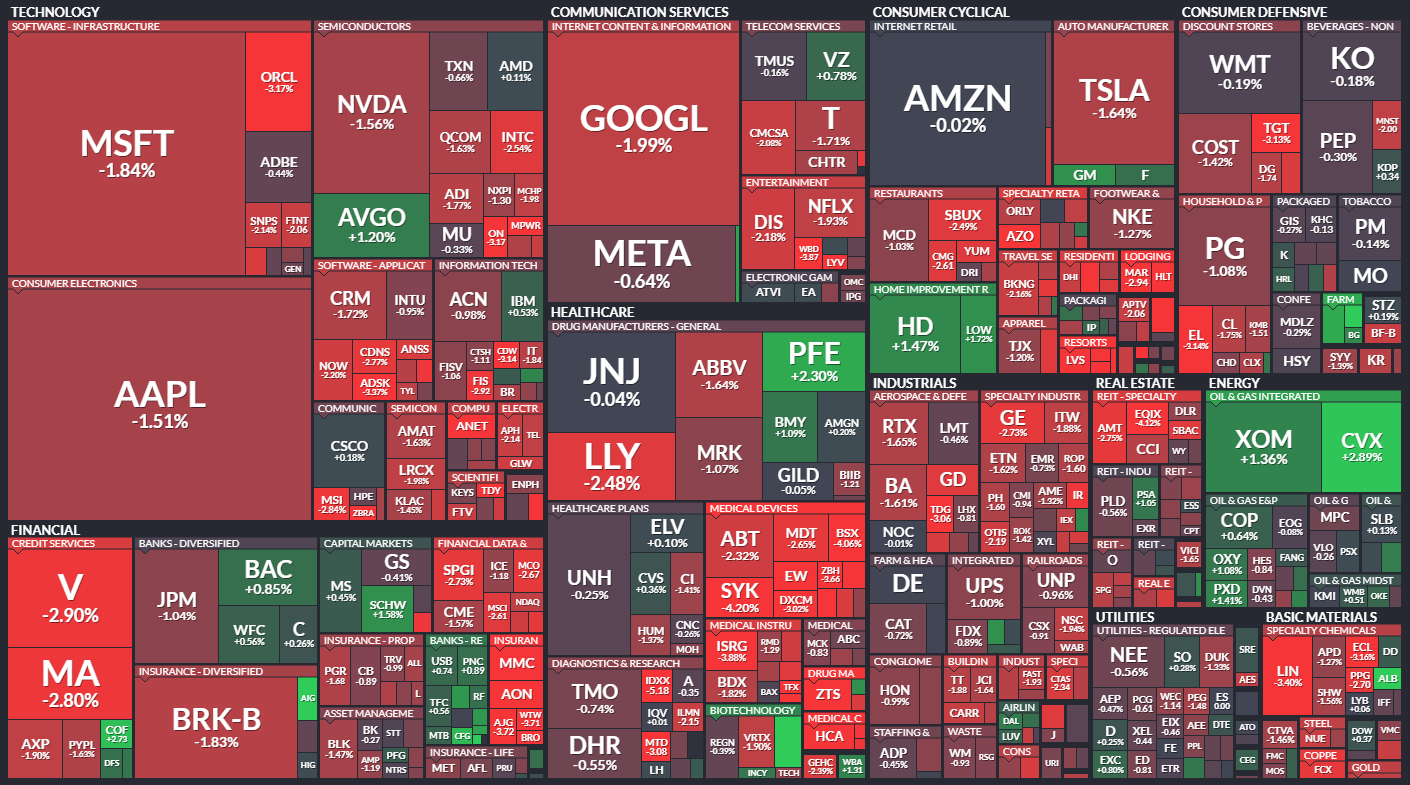
1 of 11 sectors closed green. Energy (+1.03%) led, and materials (-1.56%) lagged.
In economic news, the flash U.S. composite PMI showed that U.S. business activity rose to a 13-month high, driven by service sector strength. The Richmond Fed manufacturing activity fell in May, indicating a fifth consecutive month of worsening conditions. Meanwhile, Treasury Secretary Janet Yellen warned that the debt ceiling will likely be reached as early as June 1.
And overseas, the International Monetary Fund (IMF) joined the U.K. central bank expecting the country to avoid a recession. Its new studies suggest U.K. growth will now reach 0.4%.
Yelp shares popped as much as 12% as an activist investor seeks a sale or merger with Angi Inc. Frustrated shareholders argue that Yelp remains “shockingly undervalued” after a decade of lackluster returns.
Semiconductor manufacturer Broadcom hit a new all-time high after announcing a multibillion-dollar deal with Apple to provide U.S.-made 5G chips.
Other symbols active on the streams included: $OCEA(+28.14%), $RAIN (+1.64%), $SHPH (+46.60%), $CWBR (+223.23%), $HTCR (+92.19%), $HEPA(-17.29%), $MVLA (-8.85%), and $MBOT (-31.35%).
Here are the closing prices:
| S&P 500 | 4,146 | -1.12% |
| Nasdaq | 12,560 | -1.26% |
| Russell 2000 | 1,788 | -0.43% |
| Dow Jones | 33,056 | -0.69% |
A Retailer Recap
Investors continue to watch retailer earnings for a read on consumers’ health. We heard from several key companies today, so let’s take a look.
First up is BJ’s Wholesale Club Holdings, which matched earnings and missed revenue expectations.
The membership-based warehouse retailer reported $0.85 per share on revenues of $4.72 billion. That compared to analyst estimates of $0.85 and $4.82 billion in revenues. Same-store sales growth of 5.7% also missed analysts’ 6.1% forecast.
During prepared remarks, CFO Laura Felice said the company is dealing with an “increasingly discerning consumer environment.” Meanwhile, CEO Bob Eddy said, “We recognize that in today’s environment, consumers remain live in their shopping behavior, and members are more conscious as they continue to work to stretch their dollar.”
Overall, it adds to the cautious view we’ve heard from its competitors. The consumer is still spending but trading down as they shift their dollars towards necessities. And although executives expect the trend of disinflation to continue, consumers believe it’s likely to remain a bumpy economic environment.
$BJ shares fell 7% to nearly eleven-month lows.
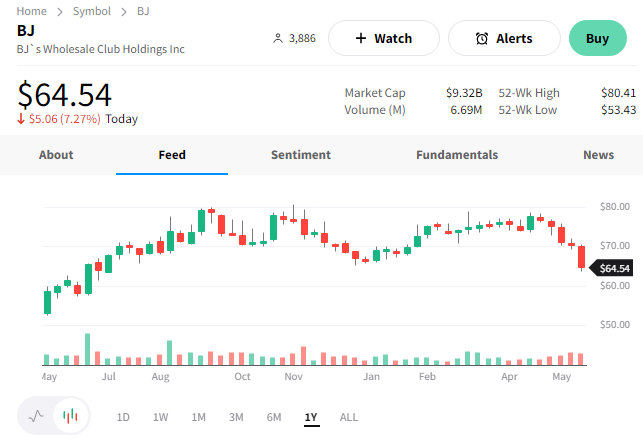
Dick’s Sporting Goods beat expectations but is still falling today.
Adjusted earnings per share of $3.40 topped the $3.18 expected. Same-store sales matched analyst expectations, rising 3.4%. Analysts say a tax benefit contributed to the earnings beat. However, a narrower-than-expected gross margin decline and healthier inventory levels were encouraging.
Executives maintained their full-year outlook for $12.90 to $13.80 earnings per share, well above the $13.38 analyst consensus view. They recognize the challenging environment for discretionary spending but believe the consumer trend of prioritizing health, wellness, and outdoor activities will continue. It’s all part of the thesis that these purchases have shifted, at least in part, from discretionary spending to necessities.
$DKS shares initially popped but closed down just over 1%.
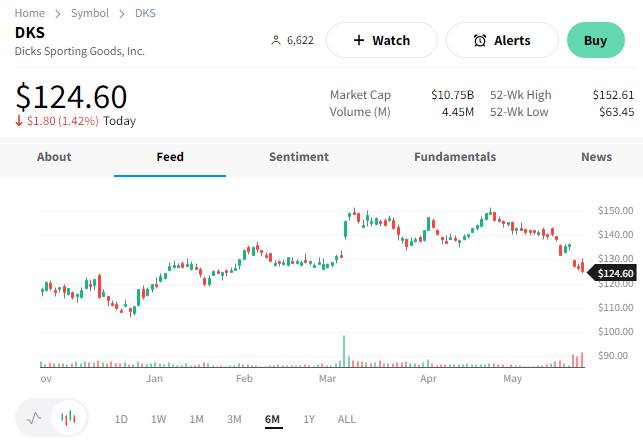
Home improvement retailer Lowe’s beat profit estimates but missed same-store sales forecasts.
Adjusted earnings per share of $3.67 beat the $3.44 expected. Total sales fell 5.5% YoY to $22.35 billion, topping the $21.60 billion estimate. However, same-store sales did decline 4.3%, more than the 3.4% expected.
Like Home Depot, lumber’s price deflation and unfavorable spring weather weighed on results. The company’s Pro and online segments delivered positive comparable sales. However, softer-than-expected demand from the “Do-It-Yourself” segment offset that strength, given it makes up most of Lowe’s customer base.
Executives remain optimistic about the medium-to-long-term outlook for home improvement. However, the near-term economic challenges caused them to pull back their full-year guidance.
They’re now expecting:
- Total sales of $87 to $89 billion (prev. $88 to $90)
- Comparable sales of -2% to -4% YoY (prev. flat to -2%)
- Adjusted operating margin of 13.4% to 13.6% (prev. 13.6% to 13.8%)
- Adjusted diluted earnings per share of $13.20 to $13.60 (prev. $13.60 to $14.00)
Like Home Depot, $LOW shares remain over 20% off their all-time highs. That likely indicates some of this slowdown news was already priced into the stock. Shares rose about 2% on today’s news.
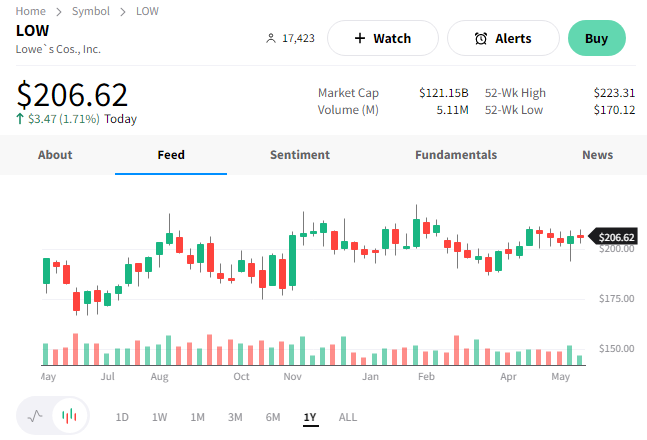
Lastly, AutoZone is pulling back from all-time highs following its earnings results.
The cart-parts retailer reported adjusted earnings per share of $34.12 on revenues of $4.091 billion. That was mixed compared to the $31.50 and $4.123 billion expected. Same-store sales growth of 1.9% also missed the 4.1% consensus estimate.
Executives said they saw sales weaken materially in March, so investors will be watching to see if that continues into the current quarter. Other retailers have reported similar experiences, which likely added to investors’ concerns. However, management focused on their long-term initiatives that position the company well for future growth.
$AZO shares fell 6% on the day.
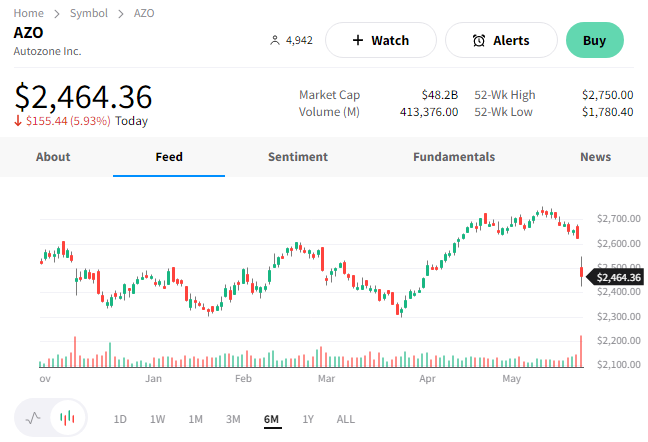
First YoY Decline Since Mid-2020
U.S. new home sales rose 4.1% MoM to an annual rate of 683,000 in April, topping the 669,000 expected by analysts. However, March’s initial 9.6% increase was revised downward significantly to 656,000.
The theme investors are watching is that the ongoing lack of existing homes for sale is forcing buyers into new construction. We’ve heard this from builders, who remain cautiously optimistic despite high-interest rates and prices weighing on affordability.
Speaking of prices, there is some positive news for hopeful buyers and the Federal Reserve.
April’s data showed that the median sale price of new homes in the U.S. experienced a YoY decline for the first time since April 2020. New data showed that prices declined 8.16%, nearly matching the last time this data saw an annual decline. It’s currently sitting at $420,800, down from October’s $496,800 peak.
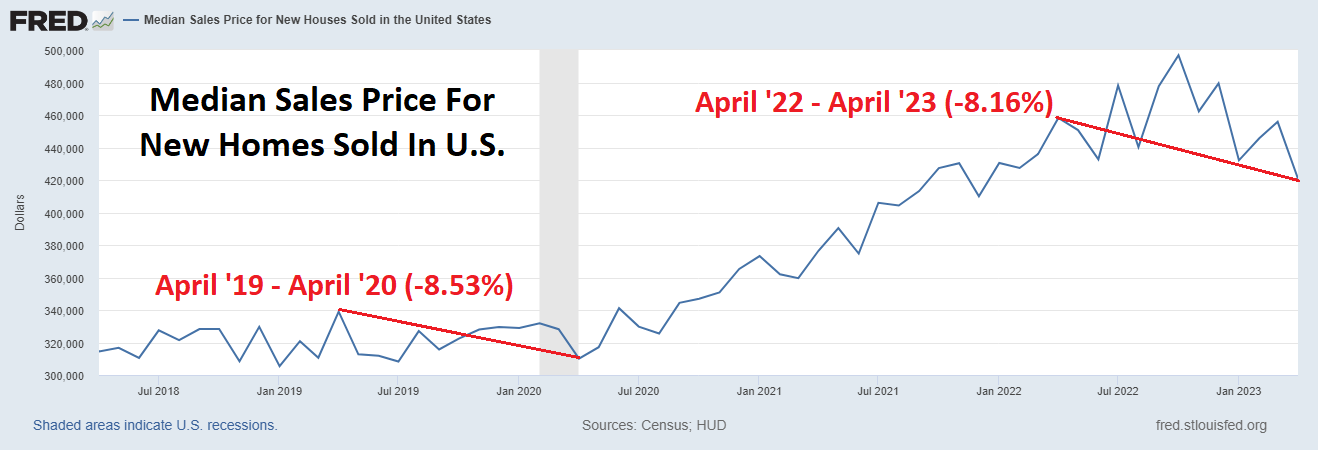
However, the long-term trend in this housing data shows prices are still above trend. Below we’re looking at the same data over the last thirty years.Clearly, the pandemic housing boom caused prices to rise at a much steeper pace than at other periods in history.

That rise in asset prices and housing spending was a key driver of inflation, so the Fed hopes this data will continue to revert to its historical average. Because if it does, that’ll make the central bank’s fight against inflation a whole lot easier.
So far, Home Depot and other retailers have offered cautious consumer outlooks, expecting the housing market cooldown to continue. We’ll have to see if they’re right, but today’s data further enforces that view.
Tech Earnings: Let’s Jump Right Intuit
Global financial technology platform Intuit kicked off tech earnings after the bell.
The company, which owns TurboTax, Credit Karma, Quickbooks, and Mailchimp, missed revenue but beat earnings expectations. Adjusted earnings per share of $8.92 on revenues of $6.02 billion were mixed versus the $8.48 and $6.09 billion consensus views.
The Small Business and Self-Employed segment led the strength. QuickBooks Online Accounting revenue grew 25% YoY, driven by customer growth, higher effective prices, and a favorable product-mix shift. Online services revenue grew 21% YoY driven by Mailchimp, QuickBooks Online payroll, and QuickBooks online payments. And total international online revenue rose 12% YoY on a constant currency basis.
Credit Karma revenues fell 12% YoY, driven by headwinds in personal loans, home loans, auto loans, and auto insurance. Where it did experience strength was in Credit Karma Money and credit cards.
Looking ahead, the company raised its full fiscal year 2023 guidance. Here’s how its YoY outlook compared to previous estimates:
- Revenue growth of 12% to 13% vs. 10% to 12%
- GAAP operating income growth of 19% to 20% vs. 9% to 13%
- Non-GAAP diluted earnings per share growth of 20%
Within those adjustments, it raised revenue guidance for the Small Business and Self-Employed group. That helped offset downward revisions for its Consumer Group, ProTax Group, and Credit Karma segment.
While executives were upbeat in their commentary, it appears investors are concerned about the underlying consumer slowdown seen in these results. $INTUshares are trading down 5% after hours.
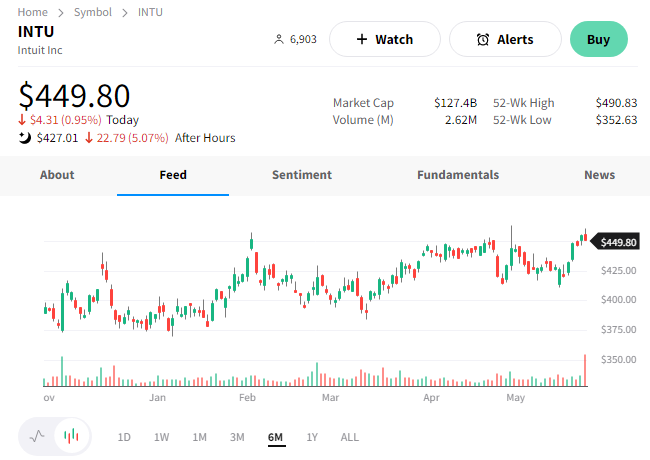
Meanwhile, Palo Alto Networks beat expectationsand raised its forecast.
The cybersecurity firm reported $1.72 billion in revenues and adjusted earnings per share of $1.10. Revenues matched consensus views, but earnings were $0.17 per share better. Another metric investors track, billings, rose 26% to $2.30 billion.
Executives raised their guidance. Here are their new full-year forecast vs. their previous estimates.
- Revenues of $6.88 to $6.91 billion vs. $6.85 billion
- Adjusted earnings per share of $4.25 to $4.29 vs. $3.97 to $4.03
- Billings of $9.18 to $9.23 billion vs. $9.1 to $9.2 billion
While they’re staying optimistic, they’re also not blind to the current environment. The company’s CEO said,“Our team again executed well in a market that continues to become more challenging.” As a result, the company remains focused on profitable growth, balancing efficiency goals while investing in medium-term initiatives.
$PANW shares were up about 4% after hours, trading just below this year’s highs.
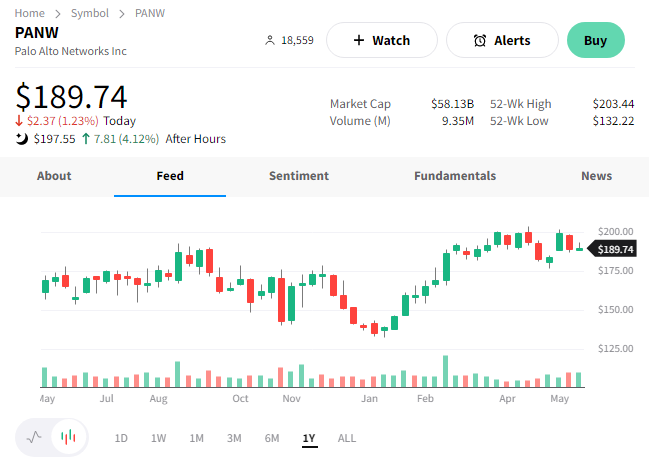
Bullets From The Day:
🚕 Uber partners with Waymo to add robotaxis to its app. The former rivals are putting their differences aside to help build consumer interest in autonomous vehicles. The multi-year partnership will begin with a set number of Waymo vehicles available for Uber and Uber Eats customers in Phoenix, where the company recently doubled its service area to 180 square miles. However, those vehicles will not be exclusive to Uber, meaning Waymo customers can also summon them when available. Currently, restrictions on where robotaxis can travel weigh on the industry’s progress, but the two companies hope to prove the concept and speed up adoption. TheVerge has more.
😠 All ‘Shell’ broke loose at the oil giant’s shareholder meeting. Executives from Shell were shielded by security staff after climate protestors unsuccessfully attempted to storm the stage at the company’s annual shareholder meeting. The move comes as climate activists ramp up the pressure on oil giants to go green following years of record profits. Dutch activist investor and campaign organizer “Follow This” proposed Climate Resolution 26, calling for Shell to align its climate targets with the Paris Agreement and commit to absolute carbon emissions cuts by 2030. More from CNBC.
🙁 Meta sells Giphy for a major loss. The world’s largest database of animated GIFs is being sold to content marketplace company Shutterstock at a steep loss. The company will pay $53 million for Giphy just three years after Meta bought it for $400 million. However, last fall, the U.K.’s Competition and Markets Authority (CMA) ruled that the acquisition was anticompetitive and ordered the company to sell Giphy. As part of the deal, Meta will enter into an API agreement with Shutterstock to provide continued access to Giphy’s content across Meta’s platforms. Variety has more.
🤖 Anthropic bags $450 million to build next-gen AI assistants. The prominent generative AI startup co-founded by OpenAI veterans has raised a new Series C funding round led by Spark Capital at an undisclosed valuation. Its latest funding expands its war chest to $1.45 billion, topping its nearest competitors, Inflection AI and Adept, by a wide margin. The funds will further the company’s goal of creating a “next-gen algorithm for AI self-teaching,” which could be used to build virtual assistants that can answer emails, perform research, and do much more. More from TechCrunch.
📝 OpenAI is exploring collective decisions on AI, similar to Wikipedia entries. The leading AI company is testing how to gather broad input on decisions impacting its artificial intelligence, according to discussions at the “AI Forward” event in San Francisco. They’ve also suggested a body like the International Atomic Energy Agency (IAEA) could place restrictions on deployment, vet compliance with safety standards, and track usage of computing power. Reuters has more.


